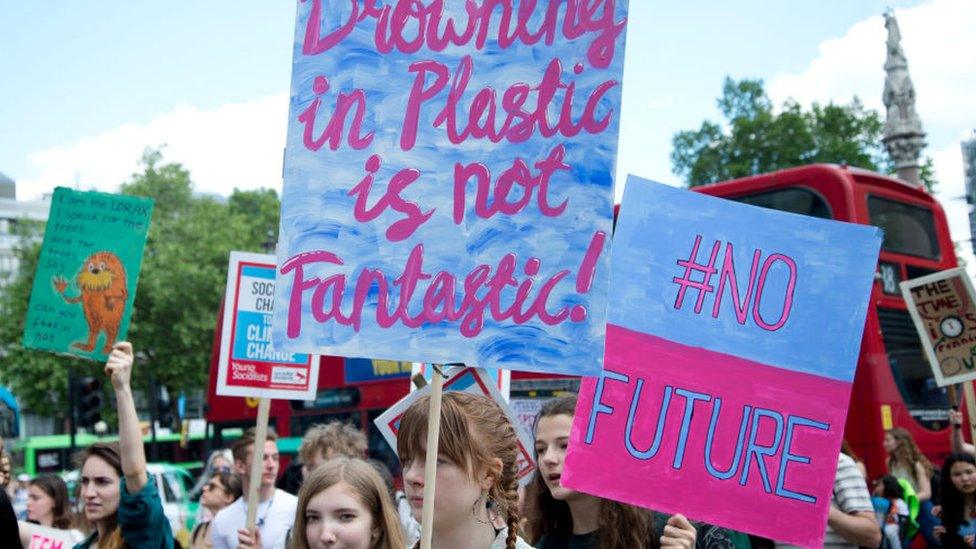Plastic pollution: Are supermarkets doing enough to ditch plastic?
- Published
- comments

Plastic pollution is one of the environmental issues protesters are concerned about
Tesco is removing plastic wrap from its multipack tins in an effort to reduce plastic waste.
The supermarket says it plans to remove 350 tonnes of plastic a year from the environment.
Huge amounts of plastic end up in our oceans or goes into landfill and it is very damaging to the the planet.
UK supermarkets put more than 900,000 tonnes of plastic packaging on their shelves a year, according to environmental charity Greenpeace.
But research last year found that supermarkets were using even more single-use plastic.
Following pressure from organisations, schools and customers, Tesco is not the only supermarket to plastic-free promises.
Kids write a letter to supermarkets asking them to do more about plastic waste
Here's what some of the main supermarkets are doing, and where they sit on a rank list, based on their plastic policies, by Greenpeace.
Let us know in the comments below whether you think what they are doing is enough and what changes you'd like to see.
Waitrose
Greenpeace ranking on plastic policies: 1st
Waitrose managed an actual decrease in their plastic footprint in 2019.
It introduced reuse and refill schemes in stores, where customers can refill their own containers with things like rice, pasta and washing-up liquid, instead of buying pre-packaged products.
It's currently trialling refill stations in four stores.
Other changes include replacing all single-use fruit and vegetable bags with a home compostable alternative.
Waitrose also aims to have all own-label cards, wraps, crackers, tags, flowers and plants glitter-free by Christmas 2020.
Tesco
Greenpeace ranking on plastic policies: 6th
The supermarket has pledged to remove hard-to-recycle materials, including PVC, from its own brand products.
In 2020 it will also trial a new online delivery scheme with products that arrive in reusable containers which can be collected, cleaned and reused.
Toothpaste tablets instead of tubes, ice cream in aluminium tins and body lotion in glass bottles are some of the examples of how it would work.
Morrisons
Greenpeace ranking on plastic policies: 2nd
Morrisons customers have been able to refill their own containers at the meat and fish counters since 2018. They also have plastic-free fruit and veg areas in many of its stores.
Other changes include trialling reverse vending machines in five stores to encourage customers to return used plastic bottles.
Future plans include fitting drinking water fountains into new stores and, by 2025, the supermarket says its branded plastic packaging to be reusable, recyclable or compostable.
Sainsbury's
Greenpeace ranking on plastic policies: 3rd
In 2018 Sainsbury's was bottom of Greenpeace's list but has since risen to third.
The supermarket has announced plans to reduce plastic by 50% by 2025. It has introduced reusable produce bags for loose fruit and vegetables.
To meet its target it says it will switch to alternative materials, using lighter-weight plastics, and introducing refillable packaging at scale.
Iceland
The girls grilling supermarkets about plastic
Greenpeace ranking on plastic policies: 7th
Iceland wants to to get rid of plastic from its own label products by 2023.
The supermarket has been working to remove plastic from fruit and vegetables and has been getting rid of black plastic trays on ready-meals.
Asda
Greenpeace ranking on plastic policies: 9th
Since they came near bottom of Greenpeace's ranking in December 2019, Asda has announced plans for a sustainability store where customers can refill their own containers.
The supermarket has also trialled a new type of coating on fresh produce, which it says could double the shelf life. The "extra peel" is made from materials that exist in seeds and fruit and veg pulp.
It recently committed to reducing plastic use by 15% by February next year, as well as making all of its own brand packaging fully recyclable by 2025.
Aldi
What are the hardest products to recycle, and why?
Aldi came bottom in the Greenpeace ranking.
A petition last year asking the supermarket to get rid of plastic packaging on fruit and veg got thousands of signatures and the supermarket has removed plastic from some of its loose fruit and veg in store.
It is currently replacing single-use plastic bags with eco-friendly options, saying the change will mean 12.5 million plastic bags are replaced by 100% compostable options.
Future plans include removing non-biodegradable glitter from Halloween and Christmas ranges by the end of 2020 and using cardboard rather than polystyrene pizza bases.
What do you think?
Are supermarkets doing enough to get rid of plastic? What changes would you like to see?
Let us know in the comments.
- Published17 March 2020
- Published19 March 2022
- Published23 January 2020
